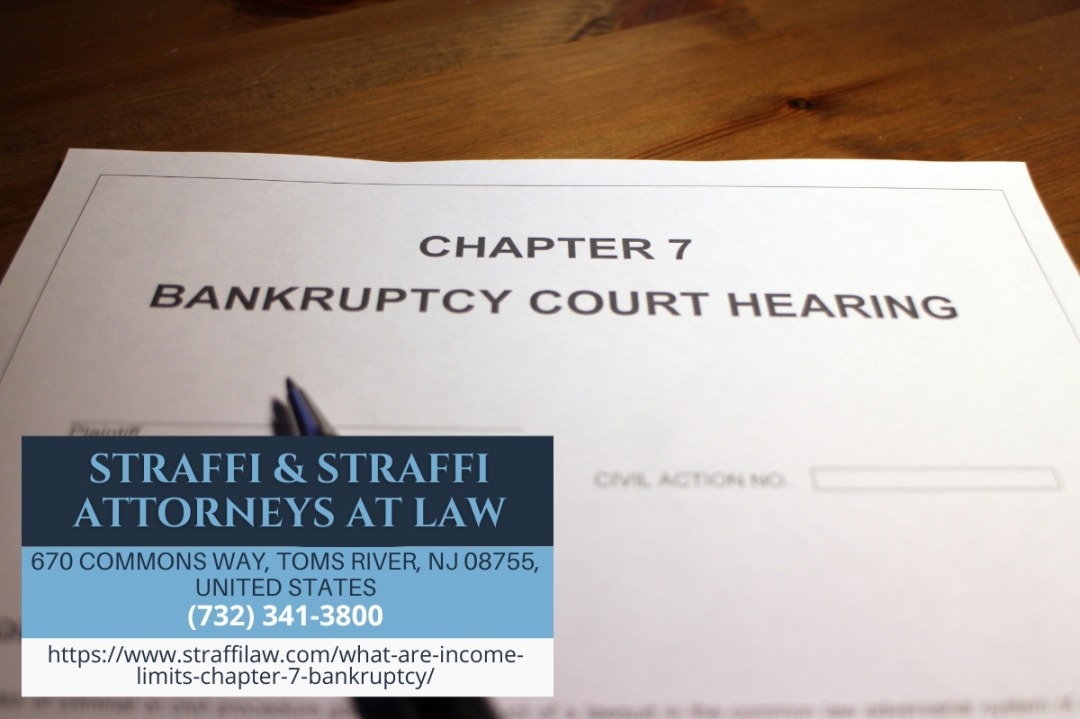New Jersey Chapter 7 bankruptcy lawyer Daniel Straffi (https://www.straffilaw.com/what-are-income-limits-chapter-7-bankruptcy/), of Straffi & Straffi Attorneys at Law, discusses the updated income limits for Chapter 7 bankruptcy in 2025 and how they affect eligibility for New Jersey residents seeking debt relief. As financial difficulties continue to impact many households, understanding these new thresholds is essential for those considering bankruptcy as a path toward financial stability. Daniel Straffi explains the importance of these updates and how individuals can determine whether they meet the necessary requirements.
Filing for Chapter 7 bankruptcy can provide significant relief by allowing individuals to discharge most unsecured debts, including credit card balances and medical bills. However, eligibility for this form of bankruptcy is determined by income thresholds set by the state. As New Jersey Chapter 7 bankruptcy lawyer Daniel Straffi explains, “To qualify for Chapter 7 bankruptcy in New Jersey, your household income must be below the state's median income for your household size. If it exceeds this limit, you must pass the means test, which assesses your disposable income after allowable expenses.”
For individuals and families in New Jersey facing overwhelming debt, understanding these income limits is crucial. The updated figures for 2025 reflect the economic realities of the state, which has a higher cost of living compared to the national average. New Jersey Chapter 7 bankruptcy lawyer Daniel Straffi advises that the first step in determining eligibility is comparing a household’s income to the state’s median figures.
The state’s new median income levels play a crucial role in determining who qualifies for Chapter 7 bankruptcy. For 2025, the median income for a one-person household in New Jersey is set at $87,010 annually. A two-person household must earn below $108,065 to qualify, while a three-person household must have an income under $130,324. For families of four, the limit is $157,479, and for a five-person household, the threshold is $166,379. Larger households have progressively higher income limits, with an additional $8,900 added per individual beyond six members.
If a debtor’s income exceeds these thresholds, they must pass the means test, which evaluates whether they have enough disposable income to pay their debts. New Jersey Chapter 7 bankruptcy lawyer Daniel Straffi explains that even those who earn more than the median income may still qualify based on their financial circumstances. The means test considers necessary expenses, such as rent, utilities, and transportation. If, after deducting these expenses, little to no disposable income remains, the individual may still be eligible for Chapter 7 bankruptcy.
While income is a primary factor in determining eligibility, other considerations play an important role in a Chapter 7 bankruptcy filing. The nature and amount of an individual’s debts, their allowable living expenses, and available exemptions can all affect whether they qualify.
New Jersey law allows filers to choose between federal and state bankruptcy exemptions to protect certain assets from liquidation. These exemptions may cover home equity, vehicles, household items, and retirement accounts, allowing filers to retain essential assets. Properly applying exemptions can make a significant difference in protecting property during bankruptcy, according to New Jersey Chapter 7 bankruptcy lawyer Daniel Straffi.
Additionally, factors such as recent income changes, prior bankruptcy filings, and the type of debts involved can impact a person’s eligibility. Secured debts, such as mortgages and car loans, are treated differently than unsecured debts like credit card balances and medical bills.
Bankruptcy laws can be complex, and filing for Chapter 7 requires careful preparation to help ensure all financial information is accurately reported. Mistakes in income reporting, miscalculations in allowable expenses, or missing important deadlines can lead to complications.
When filing for Chapter 7 bankruptcy, individuals must submit a petition that includes detailed financial information, a list of assets and liabilities, income sources, and a breakdown of monthly expenses. After filing, debtors must attend a Meeting of Creditors, where they answer questions from the bankruptcy trustee. Following this, if no issues arise, the bankruptcy court will discharge eligible debts, providing the filer with a fresh start.
Understanding the 2025 income limits for Chapter 7 bankruptcy is an essential step for those considering debt relief in New Jersey. These updated figures reflect the economic conditions in the state and help ensure that those who genuinely need financial relief can access it.
For individuals struggling with debt, consulting a knowledgeable attorney can make the process smoother and help them make informed decisions. New Jersey Chapter 7 bankruptcy lawyer Daniel Straffi and the team at Straffi & Straffi Attorneys at Law can assist clients with evaluating their eligibility, preparing necessary documents, and guiding them through each step of the bankruptcy process.
About Straffi & Straffi Attorneys at Law:
Straffi & Straffi Attorneys at Law is a trusted bankruptcy law firm based in Toms River, New Jersey. The firm can provide comprehensive legal assistance to individuals seeking financial relief through Chapter 7 and Chapter 13 bankruptcy. Led by New Jersey Chapter 7 bankruptcy lawyer Daniel Straffi, the firm is dedicated to helping clients tackle bankruptcy law and achieve a fresh financial start.
Embeds:
Youtube Video: https://www.youtube.com/watch?v=F5KSzSLs63U
GMB: https://www.google.com/maps?cid=18340758732161592314
Email and website
Email: familyclient@straffilaw.com
Website: https://www.straffilaw.com/
Media Contact
Company Name: Straffi & Straffi Attorneys at Law
Contact Person: Daniel Straffi
Email: Send Email
Phone: (732) 341-3800
Address:670 Commons Way
City: Toms River
State: New Jersey 08755
Country: United States
Website: https://www.straffilaw.com/





